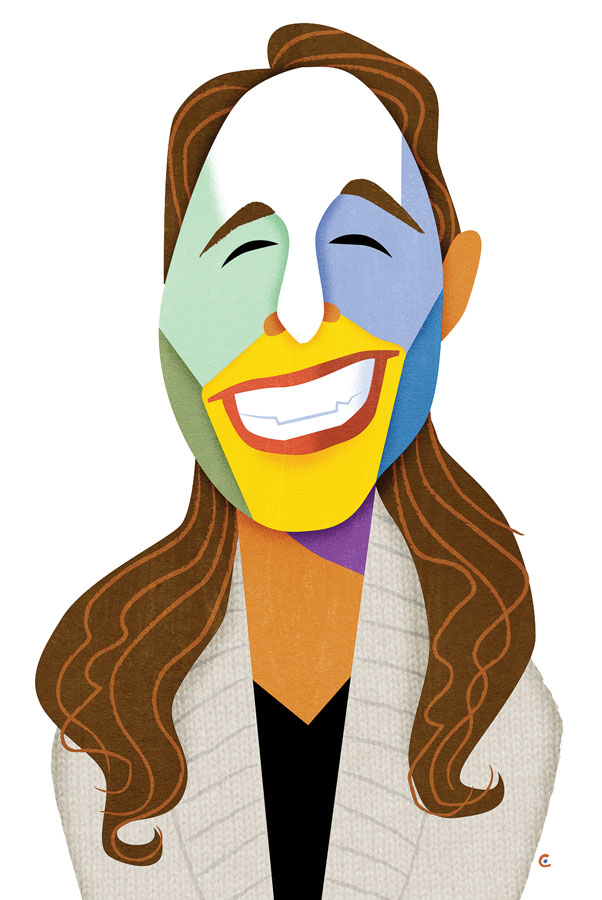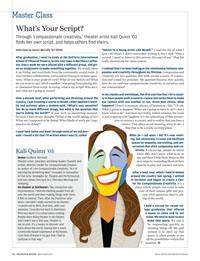Master Class
Kali Quinn ’03
Home: Guilford, Vermont
Theater artist, educator, workshop leader; founder and artistic director, Center for Compassionate Creativity; author of I Am Compassionate Creativity, “Act of Introducing Something New” (included in Innovation in Five Acts: Strategies for Theatre and Performance), and solo shows Overture to a Thursday Morning and Vamping.
On theater at Rochester: “My connection was instantaneous. I started meeting people from all over the world and then making things with them. It felt so natural. Then, after my freshman year, when I decided I really wanted to do theater, I transferred to NYU. And then, after one semester, I transferred back to Rochester. NYU was more of a conservatory setting. People were doing theater to do theater. And I didn’t see it that way. Theater is not an end. It’s a means to discover and learn about the world. Having had a more community-based experience at Rochester, I just kind of knew in my gut that I had to continue in that way.”
After graduation, I went to study at the Dell’Arte International School of Physical Theatre, in this tiny town in Northern California. Every week we were placed with a different group, and given an assignment to make something together. We would show it on Friday, and everybody from the community would come. It was constant collaboration, and constant honing in on basic questions. What is your point of view? What do you believe in? What do you want to say? All of a sudden I was going from playing other characters from script, to saying, what is my script? Who am I, and what am I going to create?
 (Illustration: David Cowles for Rochester Review)
(Illustration: David Cowles for Rochester Review)Over a decade later, after performing and directing around the country, I was teaching a course at Brown called Applied Creativity and Activism when a student said, “What’s your question? You do so many different things, but what is the question that you’re asking the world?” It was such an interesting moment, because I had always thought, “What is the world asking of me? What am I supposed to be doing? What kinds of work am I supposed to be doing?”
I went back home and went through some of my old journals. I found a list that I’d written when I was 23, called “Advice to a Young Artist Like Myself.” I read the list of what I now call values. I didn’t remember writing it, but I said, “Wait a second. I need to listen to this person, this part of me.” That list really showed me my value system.
I realized that I’ve been looking at the relationship between compassion and creativity throughout my lifetime. Compassion and creativity are two qualities that both invoke a sense of connection and a need for presence. My question became, very quickly, how do we cultivate compassionate creativity in ourselves and our communities?
In my classes and workshops, the first exercise that I do is usually to have people walk around in a space and invite them to make eye contact with one another or not. Given that choice, what happens? There’s a moment, always, of hesitation—like, “Uh-oh. What’s going to happen? What am I going to have to do? I don’t know what to do.” And then, inevitably, within minutes, the room is just erupting with laughter. It’s the unleashing of that permission to connect, to create, and to realize that you have a choice. That place of not knowing what to do—I find that to be a really exciting place.
What do I call what I do? It’s ever evolving, but ultimately, I create and facilitate spaces for empathy, storytelling, and conversation that elicit compassion and creativity. I encourage people to admit when they don’t know what to do or say, and then I help them discover the next steps by reminding them of their capacity to play and connect and love.
After a book tour, which I held in homes around the country last spring, I settled in Vermont and began to create a Center for Compassionate Creativity. It’s a place where people can come to take care of their unique gifts and process what questions they’re asking of the world.
I held a retreat for recent college graduates that offered a space to come and to not know. We tend to want to shut down that space. We end it by responding quickly, or shutting things off. My goal instead is to open up that space, to allow people to see all the possibilities within that moment.

